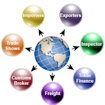This is part 9 in a series of 12 step-by-step guide to help you succeed in today's global export market.
FOREIGN MARKET
Market Entry Strategies
You have already identified your best potential market. You know that your
service can meet the standards required in the market. Now you want to decide
exactly how you are going to enter the market. Your options can be broadly
categorized as:
- exporting directly: you negotiate, contract and work with the foreign
end user
- exporting indirectly: you negotiate, contract and work with an
intermediary who negotiates and contracts with the end client
- entering into a partnership or alliance, whether formal or informal,
comprising two or more parties, all local companies or local plus others
Direct Exports
- You have a unique skill or knowledge.
- You have the resources, the cultural and language skills, and the
commitment to work directly, probably on-site, with clients in a foreign
market.
- Your clients may be in government, business or the general public.
Government clients
If you have identifed foreign government departments as potential clients:
- The government web site for the target country will provide you with
initial contact names.
- For the US Federal government - the world’s largest purchaser - contact
your Embassy in Washington for the current contact list. For US State
governments contact the US "National Association of State Purchasing
Officials" in Lexington, Kentucky to order "How To Do Business with the
States: A Guide for Vendors" and the "Contract Cookbook for the
Purchase of Services" and to register for the annual National
Assiciation of State Purchasing Officials (NASPO) conference’s workshop on
"Marketing to State Governments".
- If your clients are in developing countries, you may find information
about requirements and clients through the in-country Representatives of the
International Financial Institutions and UN Agencies.
- For government clients in any country, contact the Trade Commissioner in
the your Embassy or High Commission for advice on the correct approach.
In almost any country, a government introduction to a government client is a
good starting point.
Business Clients
Use your Business Association, and business associations
in your target market to obtain dates of conferences, dates of trade shows if
your service has a visual component, and publications (directories or
periodicals) to which your potential clients would refer.
General Public Clients
An example here is the provision of educational services by local teachers to
students who remain in their home country. At one end of the scale are the
thousands of individuals who teach from a few months to many years, often in
Asia. At the other end are the educational institutions and
professional organizations that establish courses, often in cooperation with a
partner institution in the target country.
Succeeding in Direct Exports:
- Use referrals whenever possible, either from other clients in the same
country, or from clients with similar mandates in other countries
- Participate in activities in your target market organized by Sectoral
Associations, local Chambers of Commerce, service clubs, or other business
organizations.
- Identify opportunities to meet individually in a social or professional
context, with potential clients. The social introduction is particularly
important when working in Asia, Latin America or Europe, just as membership
in Rotary or the right golf club is important in North America.
- Ensure that you are listed in professional or trade directories, on Foreign Trade Online.
- Be prepared to spend time understanding the client’s needs and focus on
those needs rather than on promoting your expertise.
- Be sensitive to the culture into which you intend to provide your
service.
- Be prepared to provide a "sample" of your service
- Be sure to talk with the financial decision makers as well as with the
technical experts
- Work with your commercial bank before finalizing your pricing or the terms and conditions of your
contract.
Indirect Exports
Your service is world class. You have identified target markets. Because
you prefer to focus on your technical expertise, you decide to work with or
through other companies that have strong marketing, cultural and language
skills and sufficient resources to market internationally. You have the
ability to work within the target market in cooperation with:
- a "lead" exporter;
- a local-based agent, representative or Trading House;
- a foreign agent, representative, or Trading House.
Identifying "lead" exporters:
- For both developing and developed countries, your local Trade
Commissioner posted in the country may be able to help identify companies
that are already active in the market and might be strengthened by adding
your expertise to their existing capabilities.
- Lists of current exporters (contractors) can be obtained from the
International Financial Institutions.
Marketing to the "lead" organization:
- Participate in activities organized in your locality by bilateral business
councils or by sectoral associations in your target market. Identify
opportunities to meet individually in a social or professional context, with
exporters already operating in your target market.
- Ensure that you are listed in professional or trade directories, on Foreign Trade Online.
Identifying agents, distributors, and trading houses
- Contact provincial, regional and national Trading House organizations
- Contact officers in sectoral departments and local governments to describe your
interests and capabilities and obtain advice about potential local or
foreign partners.
Search the web, using key words such as "exporter, importer, distributor,
agents, technology transfer, negotiator, representative" and your target
country. Narrow the search by including your service offering in the search.
Working with a lead organization
- Inform your potential clients how your involvement can help them to
achieve their aims and satisfy their clients.
The costs of preparing a proposal are often high. When this work is
undertaken by the lead organization in the hope of gaining a contract, find
ways to contribute your expertise to this work as part of your upfront
contribution. This will provide the lead company with a sample of your work,
demonstrate that you see international work as a cooperative effort and
position you as a team player.
Entering the Market Through Partnerships and Alliances
This is the optimum method of providing services in most markets. It can
provide solutions to many of the issues regarding:
- cultural and language sensitivity
- professional accreditation
- competitive pricing
- breadth of technical expertise
- creating links and synergy between providers of goods and services
- mobility of personnel
- taxation
- legal status in the target market
- eligibility to bid on target contracts
The variety of partnerships and alliances is as great as the number of
companies involved. There are various types of partnerships:
- Horizontal Alliances
- Vertical Alliances
- Business Network
- Teaming Agreement
- License Agreement
- Joint Venture
- Strategic Alliance
When applied in the international context, the range of options becomes
even greater as partnership may incorporate primarily local companies, a
combination of local and target market companies, or a group including
third country participants. Participants may find themselves in a more
competitive position as they: a) bring together strengths in the technical
aspects of the services to be provided; b) gain benefits from operating
together in the target market; c) find it easier to finance the project and,
d) find ways to better handle the issues of long-term management.
Selecting the Right Partners
- Identify the strengths needed for the tasks or project.
- Identify clearly your strengths and weaknesses and what you bring to the
partnership.
- Seek partners to complement your strengths and weaknesses.
- Be appreciative and open in recognizing the contributions of your
partners and seek the same.
- Be open about your aims and your understanding of the collective and
separate aims of all participants.
Your eventual choice of market entry method will depend on:
- your overall aims for that market
- your resources and capabilities
- the market conditions
- availability of potential agents, distributors, trading houses, partners
etc.
You may well select different market entry strategies for different
markets, and may evolve from one strategy to another over time in any market.
As a first step you can start to evaluate the most appropriate market entry
strategy for each market according to the following guidelines:
Direct Exports
may be your best
market entry
strategy if: |
Indirect Exports
may be your best
choice if:
|
Partnership and Alliances
may be the optimum if:
|
- you have the resources
- you have the cultural and language skills
- you have the commitment to work directly, probably on-site, with
clients in a foreign market
|
- your service is world standard
- you have identified target markets
- you prefer to focus on your technical expertise
- you have the ability to work within the target market in
cooperation with a lead company that can provide the necessary strong
market knowledge, cultural and language skills, significant resources
and stamina
|
- you are relatively new to the target market’s cultural and
language differences
- you require professional accreditation
- you need to offer competitive pricing
- you need breadth of technical expertise
- you need to create links and synergy between providers of goods
and services
- you require mobility of personnel
- taxation is an issue
- legal status in the target market is mandatory
- eligibility to bid on target contracts is
required
|
Your Most Important Asset
As a provider of services, your reputation is your most important asset.
That is equally true for the service companies with which you will wish to
work, whether directly, indirectly or as a partner. It is better to move
cautiously than to jeopardise one or more reputations by selecting an
inappropriate market entry strategy, by moving too quickly, by entering into
an inappropriate partnership, or by failing to nurture a good partnership
carefully enough.
|



